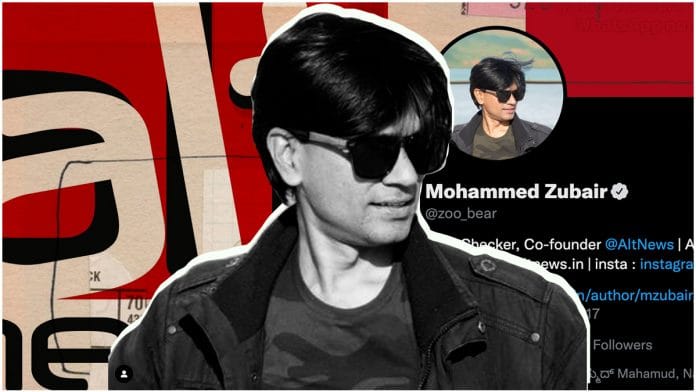New Delhi: The Uttar Pradesh Police’s investigation of Mohammad Zubair does not concern just one tweet by the Alt News co-founder, but seeks to ascertain whether he is part of a “syndicate whereby such tweets are repeatedly put out with a view to sensationalise and destabilise society”, the Supreme Court was told Friday.
“There is something more to it than meets the eye,” Solicitor General Tushar Mehta told a bench of justices Indira Banerjee and JK Maheshwari.
Mehta further said that in a separate case registered by the Delhi Police, Zubair was under investigation because his company has received foreign contributions from countries that are inimical to India.
The court was hearing Zubair’s appeal challenging a 13 June order of the Allahabad High Court that refused to quash an FIR registered against him on 1 June at Sitapur for labelling three Hindu religious leaders — Yati Narsinghanand Saraswati, Bajrang Muni and Anand Swaroop — as “hate mongers”.
On Tuesday, a judicial magistrate of Sitapur granted Zubair’s custody to the UP Police, while declining him bail. According to the UP Police, they need to take Zubair to Bengaluru to recover electronic devices, such as his laptop, as part of their probe into the “syndicate angle”.
Even though the SC bench Friday granted Zubair interim bail for five days, he will not be able to walk out for now. Zubair is also in judicial custody in connection with an FIR registered by the Delhi Police for allegedly hurting religious sentiments and promoting enmity through a tweet he posted in 2018.
The FIR at Sitapur was registered under two sections — section 295A of the IPC, which makes a deliberate or malicious act intended to outrage religious feelings of any class or insulting its religion or religious beliefs a criminal offence, and section 67 of the Information Technology Act, that criminalises electronic transmission of “lascivious or appeals to the prurient interest”.
However, the SC was told Friday that the police had decided to drop section 67 of the IT Act. Mehta, who opposed Zubair’s plea to quash the petition, said the police have now added section 153 of IPC. This penal provision allows prosecution of a person who promotes enmity between different groups on grounds of religion, race, place of birth and language.
“This is not a question of one tweet. There are multiple tweets which he has deleted,” the solicitor claimed. He assailed Zubair for suppressing “crucial facts” from the top court. Accusing him of being a “habitual offender”, Mehta informed the court about the Delhi FIR registered against him.
Also read: What India—Hindus and Muslims—missed in Supreme Court’s ‘lecture’ on Nupur Sharma
‘His overall conduct is being criminally investigated’
He assailed Zubair for not disclosing about the Delhi FIR and legal developments in the case in his petition, and argued that the suppressions must be explained. “It is a matter of record that after his tweet there was a law and order situation (in Sitapur),” Mehta argued.
He further said that his arguments against Zubair should not be construed as defending the statements made by the three religious leaders who were quoted in his tweet. “They (religious leaders) were arrested and then given bail by the competent court. The matter is under investigation.”
The Sitapur incident, Mehta reiterated, is not an isolated offence. “His overall conduct is being criminally investigated. There are six cases registered against him in the past two years.”
Appearing for the investigating officer, Additional Solicitor General SV Raju sought to demonstrate how the offences are made out. According to him, Zubair had prima facie committed the offence by describing Mahant Bajrang Muni as a “hate monger”.
“Mahant Bajrang Muni is a very well respected mahant of Sitapur. The moment you call a religious leader a hate monger, it rings a different type of bell. Whether it was intentional or not is a matter of investigation,” Raju contended.
Zubair, in his opinion, has outraged religious feelings of Mahant Bajrang Muni’s disciples. “Therefore, it requires investigation,” Raju said.
Raju advanced legal submissions to say that under a quashing plea, Zubair cannot be allowed to argue his defence. “This matter needs investigation and for that purpose we want to have a look at the laptop in Bengaluru,” the law officer added.
He contested Zubair’s argument that he had written to the police informing them about the alleged hate speech by the three religious leaders.
“He did not, he put it out to the public at large, on social media. You are attempting to promote disharmony or hatred. You are making an allegation which would amount to an attempt to incite people of different communities,” Raju said.
If Zubair was “such a nice person”, he should not have tweeted, but just sent a letter to the police, Raju said.
Defending Zubair, senior counsel Colin Gonsalves told the court that the statements made by the three religious leaders were contemptuous and that is why Attorney General KK Venugopal had granted consent to initiate contempt proceedings against them.
Zubair, Gonsalves explained, had reported those statements and did not attempt to “slander them”. “I, who captures these hate speeches, have been sent to jail. Whatever I said, I admit. Where is the case against me,” he asked.
(Edited by Gitanjali Das)
Also read: People with half-truths using social media to scrutinise judicial process, says SC judge






